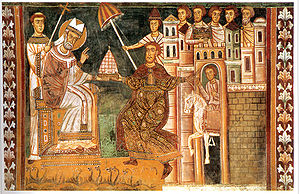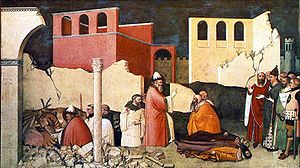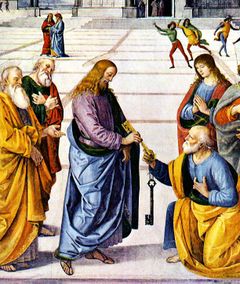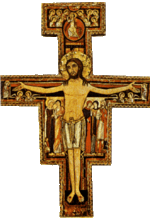Pope Sylvester I
| Sylvester I | |
|---|---|
 Sylvester I and the Emperor Constantine |
|
| Papacy began | 31 January 314 |
| Papacy ended | 31 December 335 |
| Predecessor | Pope Miltiades |
| Successor | Pope Mark |
| Personal details | |
| Birth name | Sylvester |
| Born | ??? Sant'Angelo a Scala, Avellino [1] |
| Died | 31 December 335 ??? |
| Other Popes named Sylvester | |
| Sylvester I | |
|---|---|
 Pope Sylvester I portrayed slaying a dragon and resurrecting its victims |
|
| Pope | |
| Died | 31 December 335 |
| Venerated in | Catholic Church Eastern Orthodox Churches |
| Feast | 31 December (Roman Catholic Church) 2 January (Eastern Orthodox Churches) |
| Patronage | Feroleto Antico[1]; Sylvestrine Benedictines |
Sylvester was pope from 31 January 314 to 31 December 335, succeeding Pope Miltiades.[2]
He filled the See of Rome at a very important era in the history of the Catholic Church, but very little is known of him.[3]
The accounts of the papacy of Pope Sylvester I preserved in the Liber Pontificalis (7th or 8th century) are little else than a record of the gifts said to have been conferred on the Church by Emperor Constantine I,[4] but it does say that he was the son of a Roman named Rufinus.[5]
During his pontificate were built the great churches founded at Rome by Constantine, e.g. the Basilica of St. John Lateran, Santa Croce in Gerusalemme, St. Peter's Basilica, and several cemeterial churches over the graves of martyrs.[5][6]
Saint Sylvester did not himself attend the First Council of Nicaea in 325, but he was represented by two legates, Vitus and Vincentius, and he approved the council's decision.
Part of the Symmachian forgeries, the Vita beati Sylvestri (c. 501–508), which has been preserved in Greek and Syriac; and in Latin in the Constitutum Sylvestri, is an apocryphal account of an alleged Roman council, introduced legends of Sylvester's close relationship with the first Christian emperor. They also appear in the Donation of Constantine.[5]
Contents |
Legacy
Sylvester's legendary relationship to Constantine was important in the Middle Ages. Pope Sylvester II, himself a close associate of Otto III, Holy Roman Emperor, chose the name Sylvester in imitation of Sylvester I.
In the West, the liturgical feast of Saint Sylvester is on 31 December, the day of his burial in the Catacomb of Priscilla.[5] This is the last day in the year and, accordingly, in German-speaking countries and in some others close to them, New Year's Eve is known as Silvester. In other countries too, the day is usually referred to as Saint Sylvester's Day or the Feast of Saint Sylvester. In Brazil, the long-distance running event Corrida Internacional de São Silvestre (Saint Silvester Road Race) occurs every year on 31 December.
Fictional
The Donation of Constantine is a document fabricated in the second half of the eighth century, purporting to be a record by the emperor himself of his conversion, the profession of his new faith, and the privileges he conferred on Pope Sylvester I, his clergy, and their successors. According to it, Pope Sylvester was even offered the imperial crown, which, however, he refused.[7]
"Lu Santu Papa Silvestru", a story in Giuseppe Pitrè's collection of Sicilian fables, recounts the legend as follows: Constantine the king wants to take a second wife, and asks Sylvester. Sylvester denies him permission, calling on heaven as witness; Constantine threatens him and Sylvester, rather than give in, escapes into the woods. Not long after Constantine falls ill; when he is desperate of ever regaining his health he sees a dream which commands him to send for Sylvester. He obeys, and Sylvester receives his posse in his cave and swiftly baptizes them, whereafter (having shown them several miracles) they lead him back to Constantine, whom he baptizes also. In this story Constantine and his posse are not pagans but Jews.[8]
See also
- List of 10 longest-reigning popes
References
- ↑ Patron Saints Index: Pope Saint Sylvester I
- ↑ Annuario Pontificio (Libreria Editrice Vaticana 2008 ISBN 978-88-209-8021-4), p. 8*
- ↑ Oxford Dictionary of the Christian Church (Oxford University Press 2005 ISBN 978-0-19-280290-3), article "Sylvester I, St"
- ↑ 1911 Encyclopaedia Britannica
- ↑ 5.0 5.1 5.2 5.3 "Pope St. Sylvester I" Catholic Encyclopaedia
- ↑ Helen Dietz: "The Eschatological Dimension of Church Architecture". The Biblical Roots of Church Orientation. 2005
- ↑ Oxford Dictionary of the Christian Church (Oxford University Press 2005 ISBN 978-0-19-280290-3), article Donation of Constantine
- ↑ Pitrè, Giuseppe, Fiabe, novelle e racconti popolari siciliani, Volume terzo, Palermo 1875. pp. 39–42
![]() This article incorporates text from a publication now in the public domain: Chisholm, Hugh, ed (1911). Encyclopædia Britannica (Eleventh ed.). Cambridge University Press.
This article incorporates text from a publication now in the public domain: Chisholm, Hugh, ed (1911). Encyclopædia Britannica (Eleventh ed.). Cambridge University Press.
External links
- The Life of St. Silvester, the Pope who slayed a Dragon
- Opera Omnia by Migne
- "The Evil Sylvester, Great Persecutor of the Jews" (in Hebrew, an Israeli religious website)
| Catholic Church titles | ||
|---|---|---|
| Preceded by Miltiades |
Bishop of Rome Pope 314–335 |
Succeeded by Mark |
|
|||||||||||||||||||||||||||||||||||||||||||||
|
|||||||||||||||||||||||||||||||||||||||||

